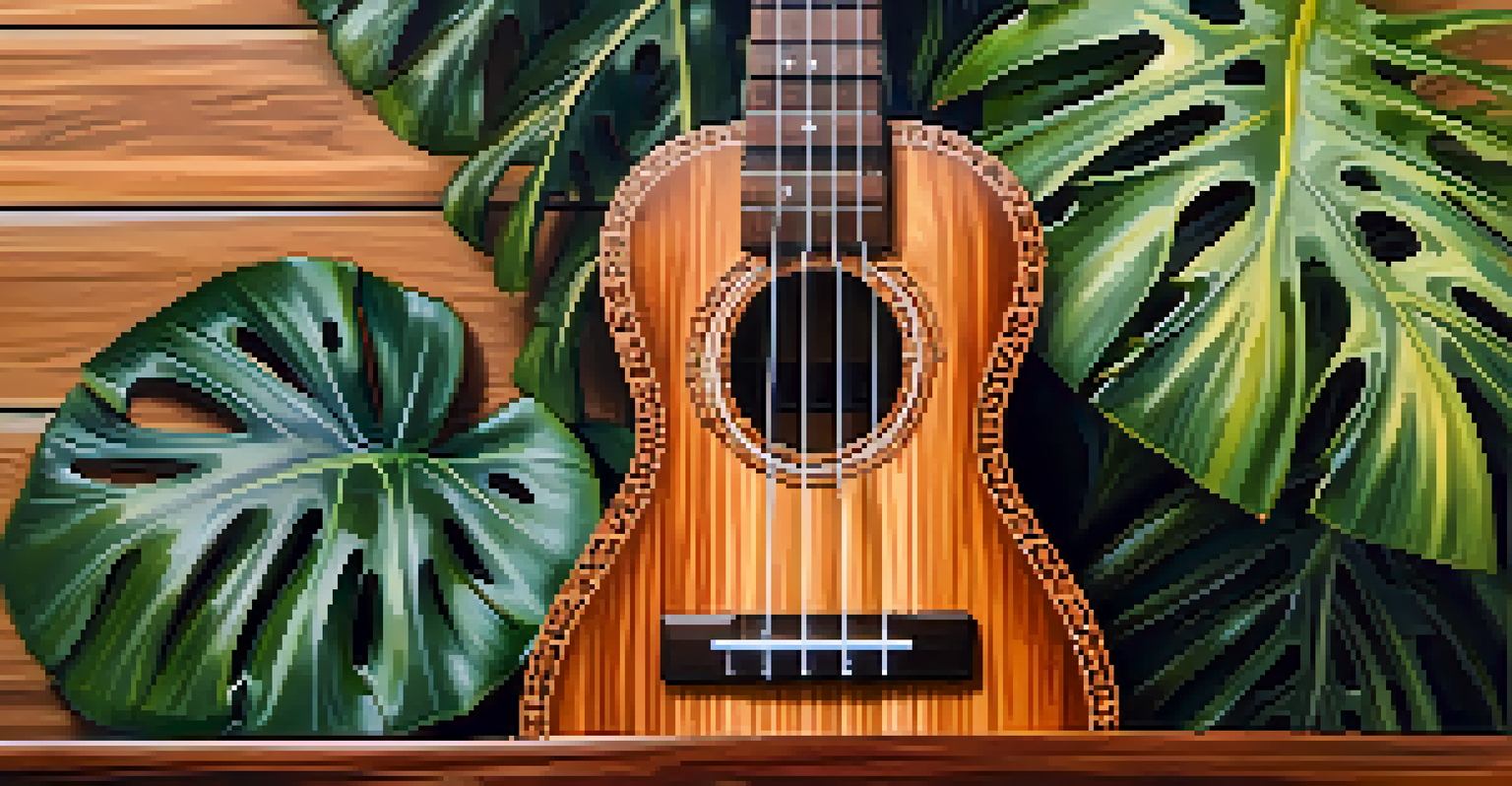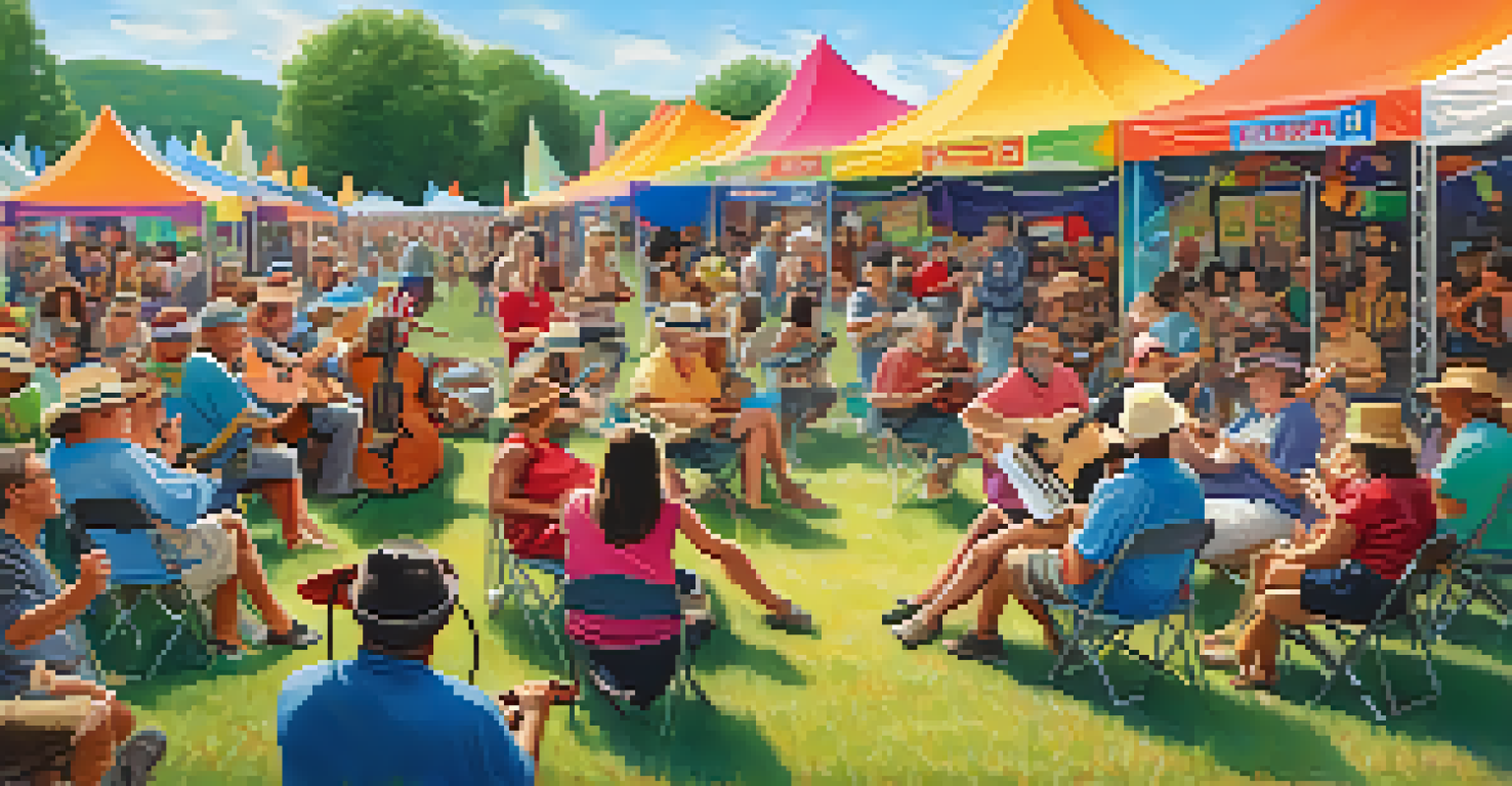The Ukulele's Journey Through Hawaiian Music and Beyond

The Origins of the Ukulele in Hawaiian Culture
The ukulele, often associated with the sunny vibes of Hawaii, has its origins in the late 19th century. It was introduced to Hawaiian music by Portuguese immigrants who brought with them the braguinha, a small guitar-like instrument. The locals embraced this new instrument, giving it the name 'ukulele,' which means 'jumping flea' in Hawaiian, a nod to the way the player's fingers move.
The ukulele is a small instrument with a big heart.
As it blended with traditional Hawaiian sounds, the ukulele became an essential part of Hawaiian music, characterized by its bright, cheerful tone. It was often played at hula performances and local gatherings, becoming a symbol of joy and celebration. The unique strumming patterns and melodies captured the essence of the islands, making it a beloved instrument in Hawaiian culture.
The ukulele's popularity continued to grow, and by the early 20th century, it had made its way to the mainland United States. Its infectious sound and portability made it a favorite among musicians and amateurs alike, setting the stage for its evolution beyond Hawaiian music.
The Ukulele's Rise in Popularity During the 20th Century
The 20th century marked a turning point for the ukulele, particularly during the 1920s when it became a staple in jazz and popular music. Artists like Cliff Edwards, known as 'Ukulele Ike,' brought the instrument into the limelight, captivating audiences with their catchy tunes. This era saw the ukulele featured prominently in vaudeville acts and early Hollywood films, further solidifying its place in American music.

As the decades rolled on, the ukulele's charm remained, adapting to various musical trends. In the 1950s and 1960s, it found a new audience with the folk music revival, being embraced by iconic figures like George Harrison of The Beatles. The instrument's ability to convey a sense of warmth and nostalgia made it a perfect fit for the folk genre, allowing it to thrive in yet another musical landscape.
Ukulele's Cultural Origins
The ukulele originated in Hawaii in the late 19th century, introduced by Portuguese immigrants and quickly embraced as a symbol of joy in local music.
By the late 20th century, the ukulele was no longer just a Hawaiian instrument; it had become a global phenomenon. Its lightweight design and user-friendly nature made it accessible to people of all ages, inviting a new generation of musicians to explore its possibilities.
Famous Ukulele Players Who Shaped Its Legacy
Throughout its history, several musicians have played pivotal roles in popularizing the ukulele. One such figure is Jake Shimabukuro, whose virtuosic playing and innovative techniques have redefined the instrument's potential. His viral rendition of 'While My Guitar Gently Weeps' showcased the ukulele's ability to convey deep emotion, attracting fans from all musical backgrounds.
Music is a universal language, and the ukulele is its ambassador.
Another influential artist is Israel Kamakawiwoʻole, whose medley of 'Somewhere Over the Rainbow' and 'What a Wonderful World' brought the ukulele to a new generation. His gentle voice combined with the soothing strums of the ukulele created a timeless classic that resonates with listeners worldwide. This iconic performance has made the ukulele synonymous with feelings of hope and tranquility.
These players, among others, have helped to elevate the ukulele beyond its traditional Hawaiian roots, showcasing its versatility and capacity for expression. Their contributions have inspired countless musicians to pick up the instrument, ensuring that its legacy continues to flourish.
The Ukulele in Modern Music Genres
Today, the ukulele is not confined to any single genre; it has seamlessly integrated into various modern music styles. From indie pop to rock, its bright sound complements a wide array of musical expressions. Artists like Eddie Vedder and Taylor Swift have incorporated the ukulele into their songs, proving that it can hold its own in contemporary music settings.
The instrument's charm lies in its ability to evoke a sense of nostalgia while still feeling fresh and innovative. Its presence in genres like reggae and folk has opened up new avenues for collaboration and creativity, allowing musicians to experiment with different sounds. This versatility is one reason why the ukulele continues to resonate with audiences of all ages.
Growth in Global Popularity
Throughout the 20th century, the ukulele evolved from a Hawaiian instrument into a global phenomenon, embraced by diverse musical genres and audiences.
Moreover, the rise of social media platforms has allowed ukulele players to share their music and connect with fans worldwide. Viral videos and tutorials have made learning the ukulele more accessible, fostering a global community of enthusiasts eager to explore its musical potential.
The Ukulele's Role in Music Education
In recent years, the ukulele has gained popularity as an educational tool in music programs across schools. Its simple chords and lightweight design make it an ideal instrument for beginners, allowing students to engage with music without feeling overwhelmed. Teachers appreciate its accessibility, as it enables students of all ages to experience the joy of making music.
Many educators have found that incorporating the ukulele into their curriculum not only enhances students' musical skills but also fosters teamwork and creativity. Group lessons and performances encourage collaboration, helping students build confidence while learning to play. The instrument's cheerful sound contributes to a positive and engaging learning environment.
Furthermore, the ukulele serves as a bridge to learning other string instruments. Once students grasp the basics of ukulele playing, they often find it easier to transition to guitars, violins, and beyond. This foundational experience lays the groundwork for a lifelong appreciation of music.
Cultural Impact and Global Community of Ukulele Players
The ukulele has transcended its Hawaiian origins to become a symbol of cultural unity and creativity worldwide. With ukulele festivals held in various countries, enthusiasts gather to celebrate their love for the instrument, share techniques, and perform together. These events foster a sense of belonging and community that transcends borders, highlighting the ukulele's ability to connect people.
An example of this global phenomenon is the Ukulele Underground, an online community where players can share their experiences, learn from one another, and collaborate on projects. Such platforms have helped cultivate a diverse range of playing styles and genres, showcasing the instrument's adaptability and appeal.
Educational Benefits of Ukulele
The ukulele serves as an effective educational tool, providing an accessible way for beginners to engage with music and fostering creativity in schools.
Through social media, ukulele players can share their music and connect with others, regardless of geographical location. This interconnectedness has not only propelled the ukulele into the spotlight but has also created a vibrant global community that celebrates creativity and passion for music.
The Future of the Ukulele: Trends and Innovations
As we look to the future, the ukulele continues to evolve, driven by innovation and creativity. Emerging technologies, like online learning platforms and digital effects, are expanding the ways musicians can experiment with the instrument. This wave of innovation allows for new sounds and techniques that were previously unimaginable, pushing the boundaries of what the ukulele can achieve.
Moreover, the resurgence of interest in vintage instruments has led to a renewed focus on craftsmanship and quality. Luthiers are exploring traditional building methods alongside modern techniques to create unique, high-quality ukuleles that appeal to both seasoned players and newcomers alike. This blend of old and new is enriching the instrument's legacy.

The ukulele's future is bright, with a growing community of musicians eager to explore its possibilities. As it continues to bridge cultural divides and inspire creativity, the ukulele will undoubtedly remain a beloved instrument for generations to come.